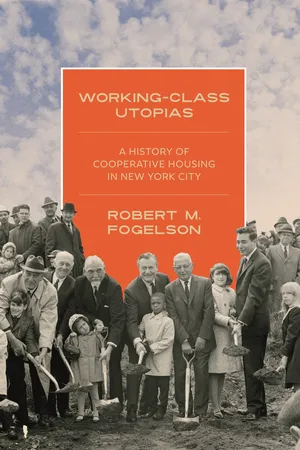
Working-Class Utopias
A History of Cooperative Housing in New York City
- 392 pages
- English
- ePUB (mobile friendly)
- Available on iOS & Android
About This Book
One of the nation's foremost urban historians traces the history of cooperative housing in New York City from the 1920s through the 1970s As World War II ended and Americans turned their attention to problems at home, union leaders and other prominent New Yorkers came to believe that cooperative housing would solve the city's century-old problem of providing decent housing at a reasonable cost for working-class families. Working-Class Utopias tells the story of this ambitious movement from the construction of the Amalgamated Houses after World War I to the building of Co-op City, the world's largest housing cooperative, four decades later.Robert Fogelson brings to life a tumultuous era in the life of New York, drawing on a wealth of archival materials such as community newspapers, legal records, and personal and institutional papers. In the early 1950s, a consortium of labor unions founded the United Housing Foundation under the visionary leadership of Abraham E. Kazan, who was supported by Nelson A. Rockefeller, Robert F. Wagner Jr., and Robert Moses. With the help of the state, which provided below-market-rate mortgages, and the city, which granted tax abatements, Kazan's group built large-scale cooperatives in every borough except Staten Island. Then came Co-op City, built in the Bronx in the 1960s as a model for other cities but plagued by unforeseen fiscal problems, culminating in the longest and costliest rent strike in American history. Co-op City survived, but the United Housing Foundation did not, and neither did the cooperative housing movement. Working-Class Utopias is essential reading for anyone seeking to understand the housing problem that continues to plague New York and cities across the nation.
Frequently asked questions
Information
Table of contents
- Cover Page
- Title Page
- Copyright Page
- Dedication
- Contents
- Prologue
- 1. The Origins of Cooperative Housing
- 2. Cooperative Housing after World War II
- 3. The United Housing Foundation
- 4. Co-op City
- 5. A More or Less Auspicious Start
- 6. Fiscal Troubles
- Photographs
- 7. Carrying Charges
- 8. The “Second Front”
- 9. “No Way, We Won’t Pay”
- 10. The Great Rent Strike
- Epilogue
- Acknowledgments
- Notes
- Index
- Image Credits